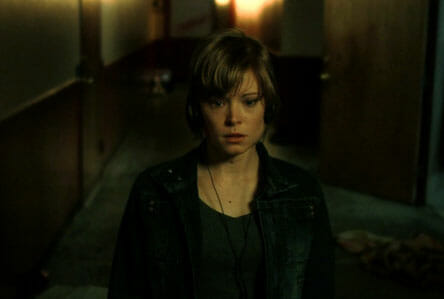Release Date: Feb. 22 (limited)
Director: David Bruckner, Dan Bush and Jacob Gentry
Writer: David Bruckner, Dan Bush and Jacob Gentry
Cinematographers: David Bruckner, Dan Bush and Jacob Gentry
Starring: Anessa Ramsey, Justin Welborn and AJ Bowen
Studio/Run Time: Magnolia Pictures, 99 mins.
Approaching films objectively is a difficult task, but as an Atlanta resident, The Signal is a more loaded prospect than most. The low-budget shocker opens with clips from The Hap Hapgood Story, a local short that did well at the 48 Film Festival several years back, and the film proudly displays telltale ATL locations obscured by other films shot in the city. Even “Terminus,” the city name used in the film, is fact rather than science fiction; Atlanta briefly used the name in the mid-19th century.
Often pegged (erroneously) as a neo-zombie flick, The Signal also takes inspiration from sci-fi nightmares like Videodrome. In a city analogous to modern America, citizens are subjected to a shifting digital signal via televisions, cell phones and radios. Results vary, but one effect is common: those exposed begin to act on their base impulses, with a severe tendency towards violence.
Mya (Anessa Ramsey) returns home from a night of infidelity with Ben (Justin Welborn) just as the tumult begins. Her suspicious husband Lewis (AJ Bowen) is already succumbing to the signal. He kills a friend, Mya flees and Lewis and Ben follow her with varying intent. As the situation worsens, the actual signal is much like the videotapes in Michael Haneke’s Cache; the origin is far less important than the effect.
A directorial trio (David Bruckner, Dan Bush and Jacob Gentry) splits the film into three “transmissions.” The result isn’t an anthology, but a single story divided into three basic perspectives, each with a distinct tonal flavor. The first is almost straightforward survival horror; the second black comedy; the third ambiguous terror.
The Signal is violent, grim and unrelenting, despite—and at moments, because of—the mid-section comic relief. Still, it’s a pleasure. As the antagonistic Lewis, Bowen makes horrific acts more unsettling with his composed, mad demeanor. And directors Bruckner, Bush and Gentry, while each technically responsible for their own section, keep the film squarely on track and the signal’s nature vague enough to stimulate conversation about the particulars.
There’s a compelling energy here unique to films that represent an unexpected shot at the big time. The Signal barrels along with little consideration for standard constraints of low-budget horror, steamrolling over the occasional technical shortcoming and moments of flawed performance, generally looking far more accomplished than the slim budget would lead you to expect. This is punk-rock cinema, thrilling and engrossing.
